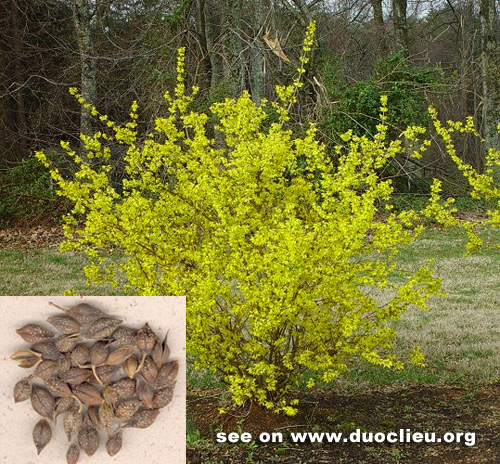Pharmaceutical Name: Fructus Forsythiae
Botanical Name: Forsythia suspensa (Thunb.) Vahl
Common Name: Forsythia fruit.
Source of Earliest Record: Shennong Bencao Jing
Part Used & Method for Pharmaceutical Preparations: The green fruit gathered in the period of White Dew (fifteenth solar term) is better than the yellow fruit picked in the period of Cold Dew (seventeenth solar term). The fruit is steamed, dried in the sun, and its seeds separated from the flesh.
Properties & Taste: Bitter and slightly cold.
Meridians: Heart, lung and gall bladder
Functions: 1. To clear heat and release toxins; 2. To relieve carbuncles and disperse nodules
Indications & Combinations:
1. Febrile disease: a) exogenous pathogenic heat at the defensive qi level manifested as headache, fever, thirst and sore throat Forsythia fruit (Lianqiao) is used with Arctium fruit (Niubangzi) and Mentha (Bohe); b) exogenous pathogenic heat entering the pericardium manifested as high fever, irritability and loss of consciousnessForsythia fruit (Lianqiao) is used with Rhinoceros horn (Xijiao) and Lotus seed (Lianzi).
2. Boils, carbuncles and furuncles. Forsythia fruit (Lianqiao) is used with Wild chrysanthemum flower (Yejuhua) and Honeysuckle flower (Jinyinhua).
3. Scrofula. Forsythia fruit (Lianqiao) is used with Prunella spike (Xiakucao), Scrophularia (Xuanshen) and Tendrilled fritillary bulb (Chuanbeimu).
Dosage: 6-10 g
Cautions & Contraindications: This herb is contraindicated during heat in the blood due to deficient yin, diarrhea due to weakness of the spleen.

